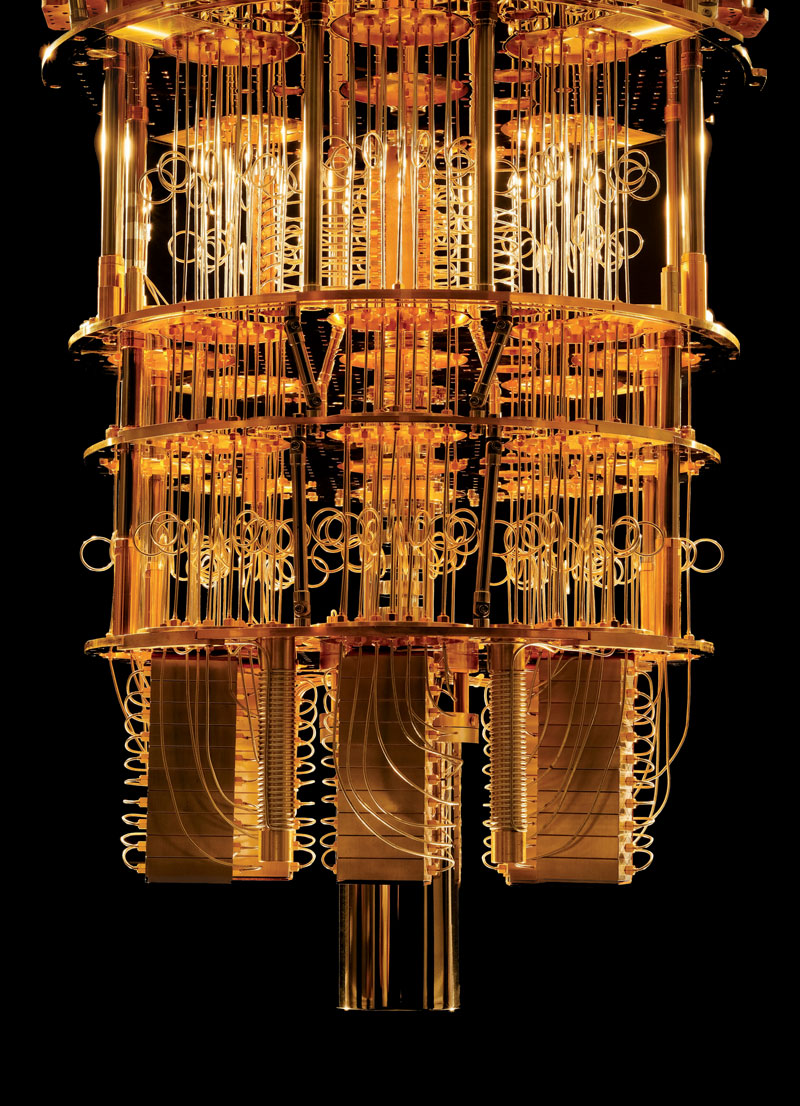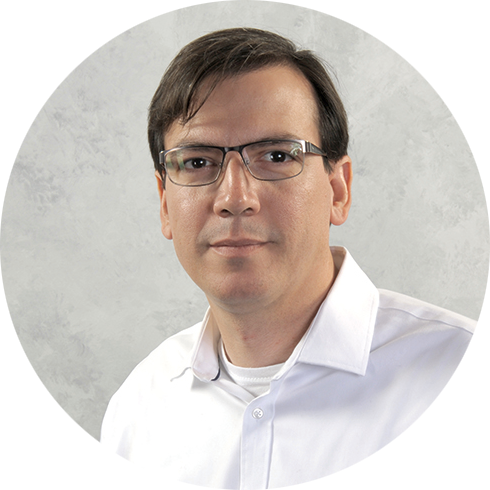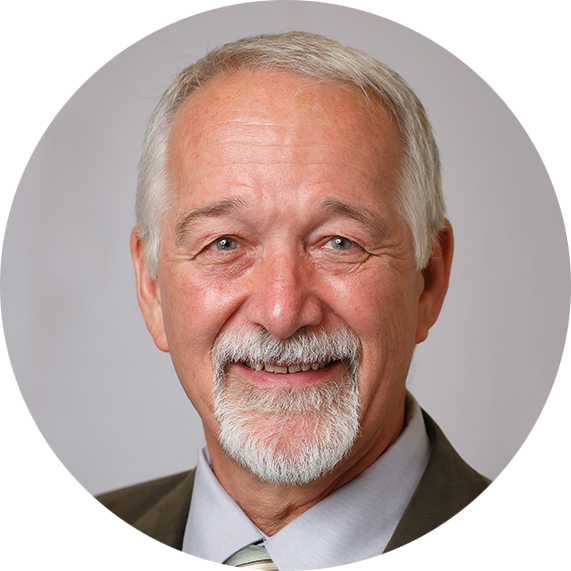
An artist’s depiction of the circuitry of a quantum computer. (Courtesy of David Parker/Science Source)
By Katie Kackenmeister
 To the casual observer, a quantum computer—with its tiered, “upside-down wedding cake” design, strands of precisely strung wires, and shiny, metallic finish—could be mistaken for a funky chandelier or a work of modern art.
To the casual observer, a quantum computer—with its tiered, “upside-down wedding cake” design, strands of precisely strung wires, and shiny, metallic finish—could be mistaken for a funky chandelier or a work of modern art.
Yet, despite the machine’s futuristic look, the computing technology, as it exists today, is somewhat clunky.
“Quantum computers are in their early stage of development,” says Tamás Terlaky, George N. and Soteria Kledaras ’87 Endowed Chair Professor in the Department of Industrial and Systems Engineering (ISE). “They have limited capacity. They are not reliable. They are ‘noisy,’ meaning error-prone. You could relate them to the early vacuum-tube, first-generation computers that existed before the silicon transistor was discovered.”
It’s the benefit of hindsight, having witnessed the wide-ranging impact of the “silicon revolution” and the invention and growth of the internet, that has Terlaky and fellow members of Lehigh’s Quantum Computing and Optimization Lab (QCOL) excited to play a leading role in what they see as the dawn of a new technological age.
QCOL was formed in 2019 with major support from the Defense Advanced Research Projects Agency (DARPA) and Lehigh’s ISE department. The group is led by Terlaky and includes ISE faculty members Luis F. Zuluaga and Xiu Yang (a 2022 recipient of the NSF CAREER award; see "Great Expectations"), computer science and engineering assistant professor Arielle Carr, graduate students, and outside collaborators from industry, national labs, and academia.
The interdisciplinary lab, a research group within Lehigh’s Institute for Data and Intelligent Systems (I-DISC), is working on optimization algorithms in quantum computing (QC) that could hold the key to “solving problems in economics, transportation and supply chains, telecommunications, and other areas that are unsolvable today,” says Terlaky.
“Quantum computing is a revolutionary new computing paradigm,” he says. “We cannot fully assess its long-term potential and impact.”
|
“This type of problem, which cannot be solved with current classical computing resources, arises, for example, when designing the placement of electronic components on a microchip.” |
Seizing a subatomic edge
“Quantum computing uses subatomic particles to represent and operate abstract mathematical concepts; like using nature to compute for us,” says ISE doctoral student Muging Zheng. “It inspires people to use an entirely new perspective to describe things that they have been working on for years, and eventually make improvements in both the classical and quantum world.”
In very basic terms, QC harnesses the unusual properties of subatomic particles to gain a computational edge. Where traditional computers process binary bits (electrical or optical pulses that translate to zeros and ones), the “qubits” (electrons or photons) used by quantum computers can exist in multiple states at one time (a property called superposition), which has the potential to exponentially increase the systems’ number-crunching power.
One of QCOL’s main goals is to evidence that quantum computers can outperform classical computers in solving sophisticated optimization problems—that is, to show that there is quantum supremacy, says Zuluaga.
As an example, Zuluaga points to the quadratic assignment problem, which aims to allocate a set of facilities to a set of locations, while minimizing costs associated with distance, commodity flow, and other factors. “This type of problem, which cannot be solved with current classical computing resources, arises, for instance, when designing the placement of interconnected electronic components onto a printed circuit board or on a microchip.”
The field has already produced major theoretical advances in the solution of unstructured search problems, such as the factorization of large numbers (the backbone behind cryptography and security keys technology), says Terlaky, but that’s only scratching the surface of its potential to supercharge optimization.
Starting at square one
The ability to solve such complex optimization problems could drive progress, not just in the next generation of electronics but also in drug development, data encryption, and a myriad of other areas of profound social impact.
That potential is a big draw for graduate students, who, Terlaky says, are among the very few pioneering researchers coming from ISE, operations research, and algorithmics areas to explore the emerging power of quantum computing in solving difficult optimization problems.
“Young researchers are curious and open-minded,” he says. “To work on something that is completely new, a lot of time and effort must be invested. At the same time, they realize that being among the first in the world to work in this area will bring strategic advantages for their careers.”
PhD student Brandon R. Augustino agrees: “It’s not very often that one is able to get in on the ground floor of such an exciting and likely impactful line of research, so I jumped at the opportunity.”
|
“Young researchers are curious and open-minded. Being among the first in the world to work in this area will bring strategic advantages for their careers.” |
Joining the quantum community
To strengthen its footing in the field, Lehigh recently became a member of the IBM Quantum Hub at NC State University. The partnership primarily gives Lehigh researchers access to cutting-edge quantum computing systems for testing algorithms, conducting experiments, and engaging in industrial collaborations.
Lehigh is also among the founding academic members of the Quantum Economic Development Consortium, a federal initiative to stimulate economic developments that are made possible by the emergence of quantum computing. QED-C also includes established companies and startups, as well as other research and academic institutions.
“We participate in workforce development activities, discussing educational programs and learning about industry case studies,” Terlaky says. “The QED-C membership showcases Lehigh as a major player in the rapidly developing area of quantum computing, and at the same time, it provides QCOL access to invaluable information about hardware and software developments, industry pilot projects, and potential internship opportunities for our students.”
And while the number of QC-related jobs is growing exponentially, he adds, the supply of highly skilled quantum optimization researchers remains limited.
“By graduation, our students will be uniquely positioned to choose an excellent job in the area of their choice.”


